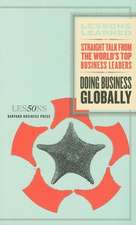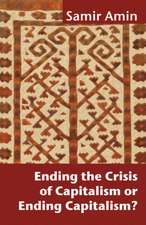Slaves, Spices and Ivory in Zanzibar: Integration of an East African Commercial Empire into the World Economy, 1770–1873: Eastern African Studies
Autor Abdul Sheriffen Limba Engleză Paperback – 16 mai 2023
The rise of Zanzibar was based on two major economic transformations. Firstly slaves became used for producing cloves and grains for export. Previously the slaves themselves were exported.
Secondly, there was an increased international demand for luxuries such as ivory. At the same time the price of imported manufactured gods was falling. Zanzibar took advantage of its strategic position to trade as far as the Great Lakes.
However this very economic success increasingly subordinated Zanzibar to Britain, with its anti-slavery crusade and its control over the Indian merchant class.
Professor Sheriff analyses the early stages of the underdevelopment of East Africa and provides a corrective to the dominance of political and diplomatic factors in the history of the area.
Secondly, there was an increased international demand for luxuries such as ivory. At the same time the price of imported manufactured gods was falling. Zanzibar took advantage of its strategic position to trade as far as the Great Lakes.
However this very economic success increasingly subordinated Zanzibar to Britain, with its anti-slavery crusade and its control over the Indian merchant class.
Professor Sheriff analyses the early stages of the underdevelopment of East Africa and provides a corrective to the dominance of political and diplomatic factors in the history of the area.
Din seria Eastern African Studies
-
 Preț: 279.67 lei
Preț: 279.67 lei -
 Preț: 259.52 lei
Preț: 259.52 lei -
 Preț: 252.77 lei
Preț: 252.77 lei -
 Preț: 260.45 lei
Preț: 260.45 lei -
 Preț: 270.78 lei
Preț: 270.78 lei -
 Preț: 256.63 lei
Preț: 256.63 lei - 23%
 Preț: 480.66 lei
Preț: 480.66 lei -
 Preț: 256.63 lei
Preț: 256.63 lei -
 Preț: 260.07 lei
Preț: 260.07 lei - 23%
 Preț: 478.74 lei
Preț: 478.74 lei -
 Preț: 232.74 lei
Preț: 232.74 lei -
 Preț: 263.54 lei
Preț: 263.54 lei -
 Preț: 259.09 lei
Preț: 259.09 lei -
 Preț: 276.77 lei
Preț: 276.77 lei -
 Preț: 280.21 lei
Preț: 280.21 lei -
 Preț: 274.07 lei
Preț: 274.07 lei -
 Preț: 262.02 lei
Preț: 262.02 lei -
 Preț: 263.16 lei
Preț: 263.16 lei -
 Preț: 235.80 lei
Preț: 235.80 lei - 23%
 Preț: 471.78 lei
Preț: 471.78 lei -
 Preț: 232.38 lei
Preț: 232.38 lei - 23%
 Preț: 477.11 lei
Preț: 477.11 lei -
 Preț: 257.18 lei
Preț: 257.18 lei -
 Preț: 236.02 lei
Preț: 236.02 lei -
 Preț: 208.49 lei
Preț: 208.49 lei -
 Preț: 278.30 lei
Preț: 278.30 lei -
 Preț: 286.90 lei
Preț: 286.90 lei -
 Preț: 257.78 lei
Preț: 257.78 lei - 55%
 Preț: 90.92 lei
Preț: 90.92 lei - 23%
 Preț: 485.86 lei
Preț: 485.86 lei -
 Preț: 258.49 lei
Preț: 258.49 lei -
 Preț: 257.92 lei
Preț: 257.92 lei -
 Preț: 258.35 lei
Preț: 258.35 lei -
 Preț: 241.86 lei
Preț: 241.86 lei -
 Preț: 223.03 lei
Preț: 223.03 lei - 19%
 Preț: 480.21 lei
Preț: 480.21 lei -
 Preț: 258.49 lei
Preț: 258.49 lei -
 Preț: 258.06 lei
Preț: 258.06 lei -
 Preț: 240.86 lei
Preț: 240.86 lei -
 Preț: 240.51 lei
Preț: 240.51 lei -
 Preț: 241.64 lei
Preț: 241.64 lei
Preț: 274.07 lei
Nou
Puncte Express: 411
Preț estimativ în valută:
52.44€ • 54.87$ • 43.56£
52.44€ • 54.87$ • 43.56£
Carte tipărită la comandă
Livrare economică 02-16 aprilie
Preluare comenzi: 021 569.72.76
Specificații
ISBN-13: 9780821408728
ISBN-10: 0821408720
Pagini: 317
Ilustrații: 34
Dimensiuni: 140 x 216 x 20 mm
Greutate: 0.38 kg
Ediția:1
Editura: Ohio University Press
Colecția Ohio University Press
Seria Eastern African Studies
ISBN-10: 0821408720
Pagini: 317
Ilustrații: 34
Dimensiuni: 140 x 216 x 20 mm
Greutate: 0.38 kg
Ediția:1
Editura: Ohio University Press
Colecția Ohio University Press
Seria Eastern African Studies
Recenzii
“This long-awaited study by Abdul Sheriff adds significant richness in both its wealth of detail and meticulous analysis to our understanding of the rise of Omani Zanzibar and its changing place in the world economy. His prodigious archival research combines with his critical approach to Marxist theory to produce a convincing and stimulating interpretation of this critically important state during a major period of transition in the history of Eastern Africa.”—Professor Edward A. Alpers of the University of California, Los Angeles
Notă biografică
Abdul Sheriff is a professor of history at the University of Dar es Salaam and the author of The History and Conservation of Zanzibar Stone Town and coeditor of Zanzibar under Colonial Rule. He is also the principal curator of Zanzibar Museums.
Descriere
The rise of Zanzibar was based on two major economic transformations. Firstly slaves became used for producing cloves and grains for export. Previously the slaves themselves were exported.Secondly, there was an increased international demand for luxuries such as ivory. At the same time the price of imported manufactured gods was falling.













